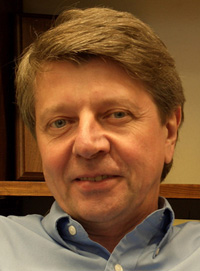 Krzysztof (Kris) Matyjaszewski received his PhD degree in 1976 at the Polish Academy of Sciences under Prof. S. Penczek. Since 1985 he has been at Carnegie Mellon University where he is currently J. C. Warner University Professor of Natural Sciences and director of Center for Macromolecular Engineering. He is also Adjunct Professor at the University of Pittsburgh and at the Polish Academy of Sciences. Kris is the editor of Progress in Polymer Science and Central European Journal of Chemistry. His publications have been cited over 42,000 times. His research interests include controlled/living radical polymerization, catalysis, environmental chemistry, and advanced materials for optoelectronic and biomedical applications.
Krzysztof (Kris) Matyjaszewski received his PhD degree in 1976 at the Polish Academy of Sciences under Prof. S. Penczek. Since 1985 he has been at Carnegie Mellon University where he is currently J. C. Warner University Professor of Natural Sciences and director of Center for Macromolecular Engineering. He is also Adjunct Professor at the University of Pittsburgh and at the Polish Academy of Sciences. Kris is the editor of Progress in Polymer Science and Central European Journal of Chemistry. His publications have been cited over 42,000 times. His research interests include controlled/living radical polymerization, catalysis, environmental chemistry, and advanced materials for optoelectronic and biomedical applications.
Please follow the link to get more information about Kris’ research group and his recent paper in Polymer Chemistry.
What was your inspiration in becoming a chemist?
Chemistry is a central science that bridges efficiently with many other disciplines. Perhaps the most exciting is its molecular aspect enabling creation of new compounds and new matter.
What was the motivation behind the research in your recent Polymer Chemistry paper? (DOI: 10.1039/C1PY00050K)
Controlled radical polymerization, including ATRP, allows chemists to link well-defined synthetic polymers with inorganics but also with natural products. Using genetically modified GFP with ATRP initiating sites and entrapping it inside nanogels is a continuation of collaboration with Ryan Mehl’s group and was spearheaded by Saadyah Averick, a talented graduate student.
Why did you choose Polymer Chemistry to publish your work?
We were invited to contribute to a special issue in this new interesting journal.
At which upcoming conferences may our readers meet you?
European Polymer Federation Meeting in Granada in June 2011.
Together with Brent Sumerlin and Nick Tsarevsky, we are organizing the 6th Controlled Radical Polymerization in Denver in late August 2011.
How do you spend your spare times?
I wish I will have some spare time…










